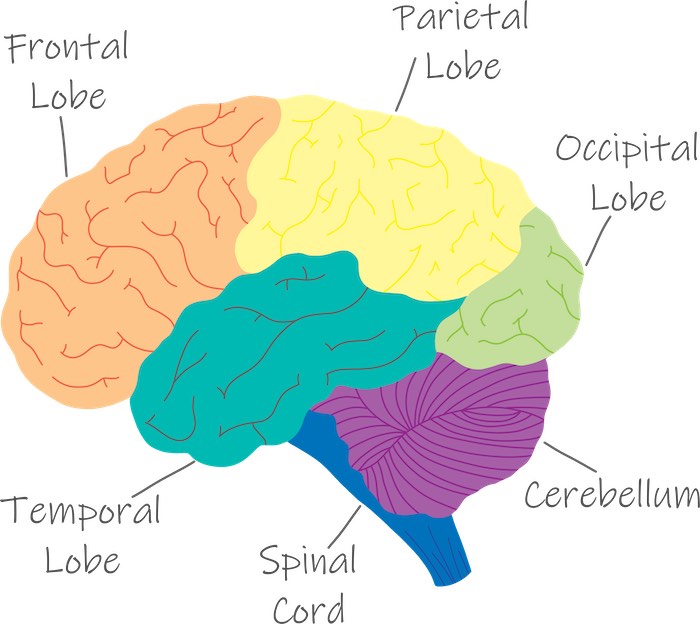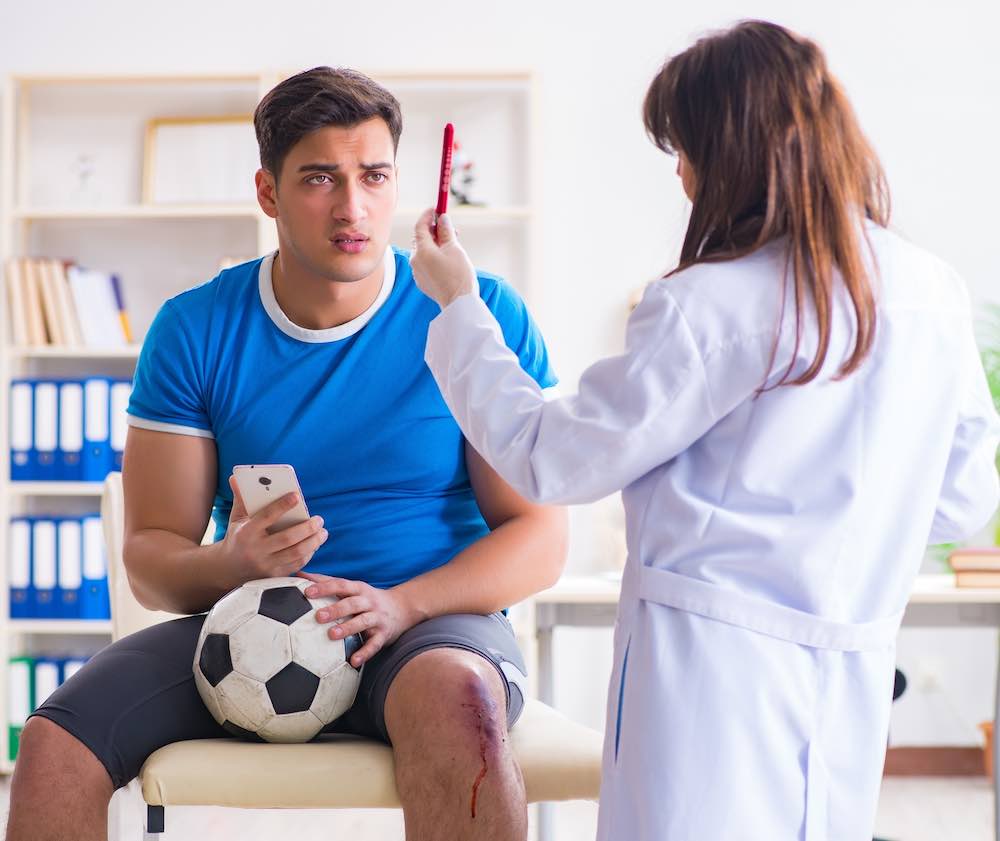Medically reviewed by Dr. Ryan House
Anyone who watches sports understands the devastation an injury to the head can be, from players being knocked unconscious on the field to repeated warnings about the long-term effects of concussions. The broadcasting of sports like football, hockey, and others has showcased the damage head injuries can cause in recent years.
In fact, UMPC.com found that “between 1.7 and 3 million sports and recreation-related concussions happen each year” and “5 in 10 concussions go unreported or undetected.”
Head injuries suffered during a sporting event have specialists on hand to offer immediate care and ensure protocols are followed. Although the frequency of head injuries to those outside of sports is fewer, care is often delayed, and the chances of a concussion going undetected are much higher.
Because of this, it’s crucial to understand concussion signs and symptoms to know when to get help and how to seek treatment.
In This Article
- What is Post-Concussion Syndrome?
- What Causes Post-Concussion Syndrome
- How Long After a Head Injury can Symptoms Appear?
- How Long Can Concussion Symptoms Last
- Who is at a higher risk for post-concussion syndrome?
- Signs & Symptoms of Post-Concussive Syndrome
- 10 Treatments for Faster Concussion Recovery
- 5 Things That May Slow Concussion Recovery
- What to Look for in a Concussion Recovery Therapist
What is Post-Concussion Syndrome?
A concussion occurs after a blow or jolt to the head that causes your brain to rapidly bounce back and forth or hit the side of your skull. This can change the chemicals in your brain and disrupt the neuronal connections it uses to communicate with the rest of your body. Because of this disruption, you may experience dizziness, loss of consciousness, memory problems, or other issues.
Post-concussion syndrome results after you suffer a concussion and your symptoms last longer than expected. For most, concussion symptoms fade away around 14-21 days post-injury. However, if the brain cannot heal itself for one reason or another, it may develop into post-concussion syndrome. For this to happen, symptoms must persist for three months or longer.
What Causes Post-Concussion Syndrome

As mentioned above, post-concussion syndrome develops when a concussion occurs, and the body cannot heal in the usual 14-21 days. This is estimated to happen in 10 to 20 percent of individuals who suffer a concussion. The reason for this delay in recovery is relatively unclear; however, understanding concussions and how they affect the body can help guide treatment.
When you experience a severe blow to the head, one or multiple parts of your brain may suffer trauma. Damage to these parts will affect how symptoms appear for both a concussion and post-concussion syndrome. To understand this better, let’s look at the six different parts of your brain and their roles.
1. Frontal Lobes
Responsible for social and cognitive behaviors, including attention, memory, muscle movement for speech, etc.
If this part of the brain is damaged, these functions will likely suffer. Car accidents and injuries where your brain is suddenly thrust into motion are what typically cause harm to this part of the brain.
2. Temporal Lobes
Responsible for comprehension, speech, and verbal and visual memory.
An injury to this part of the brain may cause you to struggle with communication and memory. The temporal lobe, like the frontal lobe, is most susceptible to injury during a car crash or similar incident.
3. Parietal Lobes
Responsible for controlling your senses, body positioning, movement, and self-awareness.
This part of the brain also allows you to perform math calculations. If this part of the brain is injured, you may struggle with your five primary senses.
4. Occipital Lobes
Responsible for vision, visual recognition, and visual attention.
Because this part of your brain is responsible for sight, if injured, you may suffer symptoms such as blind spots, distortion, and even blindness. Thankfully, due to its location at the back of the brain, the occipital lobe is not particularly vulnerable to injury.
5. Brain Stem
Responsible for the body’s most basic systems, such as breathing, heart rate, blood pressure, temperature, and other involuntary functions needed for survival.
According to a review posted by BMC, “Brainstem dysfunction may lead to sensory and motor deficits, cranial nerve palsies, impairment of consciousness, dysautonomia, and respiratory failure.”
In more serious cases, damage to this part of the brain can also result in brain stem death, which means the brain has permanently ceased functioning. If this occurs, the patient dies even if the heart continues beating.
6. Cerebellum
Responsible for coordination, voluntary movement, balance, and reflex.
If this part of the brain suffers an injury, your balance, coordination, movement, and ability to judge depth perception may be affected. On top of that, you may also deal with tremors, weak muscles, slurred speech, or suffer abnormal eye movement.
Many of the functions each part of the brain is responsible for overlap. For example, both the temporal and frontal lobes are responsible for memory, so determining what part of your brain is likely not something you can determine from home.
Other Systems Affected by Concussions
Aside from the brain, other systems may be affected after a concussion, and different symptoms may appear depending on which has been harmed.
Autonomic nervous system dysfunction
Damage to the autonomic nervous system affects your heart rate, blood pressure, digestion, and other things your body does without direct control from your conscious mind.
When you suffer a blow to the head, this part of your brain may cease to function correctly, leaving you with symptoms like fainting.
Damage to the vestibular system
Your vestibular system controls your balance. It informs your brain of where your body is in relation to your head.
The National Library of Medicine states, “If the system is damaged, balance, control of eye movements when the head is moving, and sense of orientation in space are all adversely affected. These manifestations of vestibular damage are especially important in the evaluation of brainstem injury.”
This is important to note because dizziness, confusion, or loss of consciousness is often thought of as key symptoms when self-diagnosing a concussion.
Vision problems due to damage to the vestibular system
No matter the state of your eyesight on a day-to-day basis, if you suffer a head injury, there’s a good chance your vision will suffer as well.
For some, this will occur directly after the injury takes place. Your vision is controlled by your occipital lobe which may make you think you are “seeing stars” after being hit. In actuality, you are watching your brain misfire electrical impulses due to being injured.
How Long After a Head Injury can Symptoms Appear?
The rate at which concussion symptoms emerge after the injury will vary from person to person, and according to Mayo Clinic, can wait days or even weeks to appear.
For some, symptoms will occur immediately following the injury in the form of losing consciousness, dizziness, nausea, headaches, or being bothered by light or noise.
For others, symptoms can take longer to show up and therefore be difficult to spot. Things like trouble sleeping, emotional turmoil, or clouded thoughts can all be signs that a brain injury has occured.
But because these symptoms may not show up until later, you may be more likely to blame these issues on other factors, such as life circumstances or past emotional trauma. This is why it’s essential to understand concussions and how to treat them, even long after the injury.
How Long Can Concussion Symptoms Last
The brain is a tricky instrument. While we know a lot about how it works, there are still plenty of unknowns. However, through observing those who have suffered concussions, we know that symptoms typically appear within the first seven to ten days and generally go away within three months.
For some, concussion symptoms can last much longer, even up to a year or more which is where post-concussion syndrome comes in.
Who is at a higher risk for post-concussion syndrome?
Anyone who suffers a brain injury or concussion is at risk for developing post-concussion syndrome. However, the National Library of Medicine notes that those who have suffered more than one brain injury are at an increased risk for developing post-concussion syndrome.
Brain injuries and dementia
Aside from the physical and mental symptoms that may appear in the first days or months following the injury, studies have shown a link between brain injuries and dementia.
One study posted by the Wiley Online Library found a strong association between those who suffered at least one traumatic brain injury in their lifetime and those who suffered from non-Alzheimer’s disease forms of dementia.
While dementia is not guaranteed after a brain injury, it is yet another reason to seek treatment should you suffer a concussion.
Signs & Symptoms of Post-Concussive Syndrome

Due to the prolonged nature of post-concussion syndrome, some symptoms may be difficult to connect back to a brain injury.
For some, concussions can cause depression. One study showed that at least one in five people who suffered a traumatic brain injury also suffered at least one episode of major depression in the first six months.
Other signs and symptoms of post-concussion syndrome include
Physical symptoms
- Headaches that often feel like tension headaches
- Dizziness or trouble balancing
- Nausea or vomiting (most likely to happen early on)
- Fatigue or tiredness
- Ringing ears
- Blurry vision
- Sensitivity to noise or light
- Decrease in smell or taste (this is very rare)
- Issues falling asleep or sleeping too much
Note: There is a popular myth that those who suffer a concussion should not be allowed to sleep for fear of them falling into a coma and dying.
This is simply not true.
Richard Figler, MD from Cleveland Clinic, states, “There is no evidence to support that waking someone up with a suspected concussion (or not letting them sleep at all) is needed or beneficial.”
Mental and Emotional Symptoms
- Feeling irritable or anxious
- Trouble concentrating
- Memory issues
- Shorter attention span
- Brain fog
- Sadness
- Feeling more emotional than usual
- Depression
No head injury should be taken lightly. If you suffer from any of the above symptoms following head trauma, even weeks after the fact, talk to your healthcare provider.
If you struggle with depression and think it may result from a head injury, don’t hesitate to reach out to us on our contact page or request an appointment here. [CTA BUTTON]
10 Treatments for Faster Concussion Recovery
According to Mayo Clinic, no single test can prove you have post-concussion syndrome. On the same note, no specific treatment is routinely prescribed to help alleviate symptoms. Instead, it is about finding what works best for you. Your healthcare provider should be able to come up with a treatment plan based on your needs and specific circumstances.
Before talking to your healthcare provider about your options, here are some of the most common ones for helping patients suffering from post-concussion syndrome.
10 Different Treatments
Following a concussion and when dealing with post-concussion syndrome, the most beneficial thing you can do to aid in recovery is rest–both physically and mentally. However, by the time post-concussion syndrome develops, rest, though still necessary, may or may not help much in the long run. Still, several different therapies have been shown to help ease the symptoms.
Physical therapy
Physical therapy is often used after an injury to rehabilitate the affected area and get it used to movement again. However, it can also benefit those who have suffered concussions and struggle with headaches or neck pain.
Because physical therapy focuses on rehabilitation, a physical therapist can assist with symptoms such as dizziness, vision, and balance issues.
ConcussionAlliance.org also points out that autonomic nervous system dysfunction can be helped through aerobic exercise programs. These programs may involve walking, jogging, or swimming under the supervision of a physical therapist.
Occupational Therapy
Much like physical therapy, occupational therapy helps you adapt to day-to-day life while dealing with post-concussion syndrome.
The difference between occupational and physical therapy is that occupational therapy focuses not only on the injury but also on other factors, such as your environment and mental health. An occupational therapist will screen you for physical and cognitive symptoms to formulate and execute a treatment plan.
Seeking an occupational therapist is recommended if your symptoms last more than four weeks post-injury.
To learn more about how our occupational therapists can help, reach out to us on our contact page or request an appointment here.
Cognitive Therapy
Cognitive therapy, or cognitive behavioral therapy, is a form of psychotherapy focusing on thought patterns and their effect. Those who suffer from post-concussion syndrome may often deal with symptoms such as depression, anxiety, memory issues, or difficulty concentrating.
According to a 2020 meta analyst posted by the National Library of Medicine, cognitive therapy’s effect on post-concussion syndrome remains unclear. However, cognitive behavioral therapy is considered “the gold standard” in psychology for its ability to help a wide range of psychological disorders.
That said, cognitive therapy may be a valuable tool if you struggle with mental and emotional symptoms from post-concussion syndrome, as it may help you cope with those issues.
To learn more about how our cognitive therapists can help, reach out to us on our contact page or request an appointment here.
Neuromuscular Therapy
Neuromuscular therapy is a form of massage therapy. According to the American Institute of Alternative Medicine, neuromuscular therapy is medical in nature and isn’t used for daily stressors like other massage therapies are. Its purpose is to release strain by focusing on different trigger pings and fatiguing the muscles.
This is helpful for those who suffer from post-concussion syndrome because of its ability to relieve common symptoms.
A small study posted by the International Journal of Therapeutic Massage & Bodywork, “Positive results for this case highlight the potential importance of massage therapy work to reduce headache, dizziness, and nausea in concussion recovery. In the presence of such outcomes, massage therapy may also have a supportive role in a person’s return to function after concussion.”
Vestibular Therapy
Vestibular therapy aims to repair the damage done to the vestibular system after a concussion.
It is an excellent option for those with dizziness or balance impairments. This therapy includes exercises like eye movement control, stretching and strengthening the body, and retaining balance.
Neuropsychology
Neuropsychology focuses on how the brain communicates with the nervous system and its relation to a person’s behaviors and cognition.
Neuropsychology can be extremely helpful when dealing with brain injuries. Because brain injuries can affect different aspects of your mind and body, a neuropsychologist will run tests and evaluate how well your brain is functioning. From there, they will be able to help you understand the core issue and guide you toward recovery.
A paper by Joseph F. Kulas, Ph.D. and Richard I. Naugle, Ph.D. from the Cleveland Clinic list what aspects of the brain are evaluated while under the care of a neuropsychologist.
- General intellect
- Learning and comprehension
- Language skills
- Memory
- Executive functions (functions you use when organizing, planning, problem-solving, and other like things)
- Visuospatial skills and reasoning (your ability to recognize and identify objects)
- Motor functions
- Psychopathology (your mental health)
Knowing what you struggle with will help the neuropsychologist determine what is going on in your brain. The same paper also lists symptoms for determining if neuropsychology testing is needed, including
- Short-term memory issues
- General confusion
- Changes in personality not attributed to anything else
- Sudden poor decision-making (including poor financial decisions)
- Being unable to recognize people you know
- Difficulty with language
- Difficulty with concentration or attention.
If you suffer from any of the above symptoms following a brain injury, talk to your healthcare provider to see if neuropsychology is a good option for you.
Neuro-optometric rehabilitation treatment
Neuro-optometric rehabilitation focuses on alleviating vision-related symptoms after a head injury. According to Dr. Russel Lazarus from the Optometrists Network, a neuro-optometric consultation “involves in-depth testing to analyze the communication between the visual system and the brain, and how the injury affects daily tasks, such as balance and movement, reading, and more.”
She goes on to explain several different ways treatment may be administered, including using an eye patch, prism lenses, glasses, or vision therapy (a personalized program that helps improve communication between your eyes, brain, and body).
Neurofeedback Therapy
Neurofeedback (or biofeedback) is a non-invasive therapy that works to help your brain run smoother. It does this using a computer or electronic device to interact with your brainwaves to help them function optimally.
The procedure is painless and passive, making it an excellent option for those dealing with brain injuries and post-concussion syndrome.
If you want to learn more about how this works and how we can help you, check out our page about neurofeedback here to learn more.
Hyperbaric Oxygen Therapy
Another non-invasive treatment method for post-concussion syndrome is hyperbaric oxygen therapy. This therapy involves lying in a pressurized chamber containing 100% pure oxygen for about an hour. This provides your body with more oxygen than normal air does, which will help your body heal your brain.
To learn more about how hyperbaric oxygen therapy works, check out our article Here.
Medications
Unfortunately, there are no known medications for post-concussion syndrome. However, some medications, such as Ibuprofen, Tylenol, and other painkillers, can help ease pain symptoms.
Most painkillers are generally safe by the time post-concussion syndrome develops. Still, be sure to talk to your healthcare provider before taking over-the-counter medicine, as some painkillers increase the risk of brain bleeds.
The treatment options above are listed in no particular order. You and your healthcare provider must decide what is best based on your symptoms and what you are comfortable pursuing.
5 Things That May Slow Concussion Recovery
Injuries to the brain are far from simple. Everyone will recover at a different rate, and symptoms will look different for each person. Also, once you suffer from one concussion, you are more susceptible to suffering a second one.
Because of this, there are several activities to avoid after suffering a brain injury–especially in the first few weeks. Beaumont.org notes that these activities “make the brain work harder to process information and can exacerbate symptoms and slow the recovery process.”
Some of these activities include:
- Screentime of any kind
- Driving
- Listening to loud music or using headphones
- Physical activity (unless prescribed by your healthcare provider)
- Any activity that could lead to a second blow to the head
So when is it safe to continue these activities again?
It’s best to wait until your healthcare provider gives you clearance. However, if you develop post-concussion syndrome, this could take months or years. If your symptoms persist longer than initially expected, ask your healthcare provider about the treatment methods listed above.
What to Look for in a Concussion Recovery Therapist
As already mentioned, 10 to 20 percent of people who suffer a concussion may later suffer from post-concussion syndrome. Because of this, it’s essential to know what to look for in a concussion recovery therapist.
The best place to start is with a recommendation from your general healthcare provider. But no matter how you come across a therapist who may be able to help, there are a few key questions that should be asked before seeking treatment from them.
Questions to ask your concussion recovery therapist
Whatever type of treatment you pursue, there are a few basic questions that are good to ask during your first assessment. The answers will help you determine if that particular therapist is right for you and your situation.
Note: If you struggle with anxiety, you may be able to email your general questions to the provider.
- What are their qualifications?
- Do they accept your insurance/what cost is involved?
- What paperwork will need to be done? Can it be filled out at home or online?
- Do they specialize in concussion treatment or post-concussion syndrome?
- What is their success rate with patients with similar symptoms?
- What will treatment entail? (Visits per week, how long will each visit last, activities involved, etc.)
- What should you expect during the first visit? Is there anything you should do to prepare?
- How long does treatment usually last?
Things to tell your healthcare provider
Once you find the right therapist for you, it’s a good idea to share some background information to help with the assessment process. Basic questions will be listed on your intake paperwork, such as what medications you take, when the injury happened, etc. However, there are a few other things your therapist may want to know if you are comfortable sharing.
- Do you have any religious or spiritual beliefs that may need special accommodations during treatment?
- Are there any treatment methods you are not comfortable trying?
- Do you have any limitations that may keep you from receiving treatment? (Lack of transportation, inability to swallow pills, etc.)
- Do you have any fears or phobias that make receiving treatment uncomfortable? What could be done to ease that anxiety?
It’s not uncommon to feel nervous before receiving medical care. In fact, one United States survey found that one-third of the respondents avoided seeking medical help, even though they knew the treatment was necessary.
It’s important to remember that medical and mental health professionals are there to help. If you would like to schedule an appointment or talk to our team about your post-concussion symptoms, contact us on our contact page, call (602) 704-2345, or request an appointment here.
Finding the right care
can be difficult.
We make it easier.




